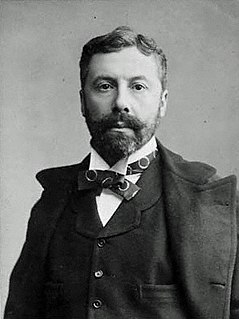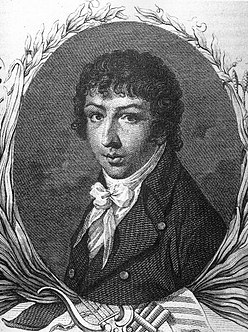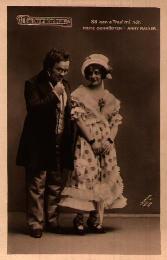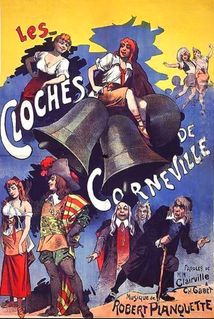
Henry Purcell was an English composer. Although incorporating Italian and French stylistic elements into his compositions, Purcell's legacy was a uniquely English form of Baroque music. He is generally considered to be one of the greatest English composers; no later native-born English composer approached his fame until Edward Elgar, Ralph Vaughan Williams, William Walton and Benjamin Britten in the 20th century.

Richard D'Oyly Carte was an English talent agent, theatrical impresario, composer and hotelier during the latter half of the Victorian era. He built two of London's theatres and a hotel empire, while also establishing an opera company that ran continuously for over a hundred years and a management agency representing some of the most important artists of the day.

Sir Charles Villiers Stanford was an Irish composer, music teacher, and conductor. Born to a well-off and highly musical family in Dublin, Stanford was educated at the University of Cambridge before studying music in Leipzig and Berlin. He was instrumental in raising the status of the Cambridge University Musical Society, attracting international stars to perform with it.

Gypsy is a 1959 musical with music by Jule Styne, lyrics by Stephen Sondheim, and a book by Arthur Laurents. Gypsy is loosely based on the 1957 memoirs of Gypsy Rose Lee, the famous striptease artist, and focuses on her mother, Rose, whose name has become synonymous with "the ultimate show business mother." It follows the dreams and efforts of Rose to raise two daughters to perform onstage and casts an affectionate eye on the hardships of show business life. The character of Louise is based on Lee, and the character of June is based on Lee's sister, the actress June Havoc.

A burlesque is a literary, dramatic or musical work intended to cause laughter by caricaturing the manner or spirit of serious works, or by ludicrous treatment of their subjects. The word derives from the Italian burlesco, which, in turn, is derived from the Italian burla – a joke, ridicule or mockery.

The Opéra-Comique is a Parisian opera company, which was founded around 1714 by some of the popular theatres of the Parisian fairs. In 1762 the company was merged with, and for a time took the name of its chief rival the Comédie-Italienne at the Hôtel de Bourgogne, and was also called the Théâtre-Italien up to about 1793, when it again became most commonly known as the Opéra-Comique. Today the company's official name is Théâtre national de l'Opéra-Comique, and its theatre, with a capacity of around 1,248 seats, sometimes referred to as the Salle Favart, is located in Place Boïeldieu, in the 2nd arrondissement of Paris, not far from the Palais Garnier, one of the theatres of the Paris Opéra. The musicians and others associated with the Opéra-Comique have made important contributions to operatic history and tradition in France, and to French opera. Its current mission is to reconnect with its history, and discover its unique repertoire, to ensure production and dissemination of operas for the wider public. Mainstays of the repertory at the Opéra-Comique during its history have included the following works which have each been performed more than 1,000 times by the company: Cavalleria Rusticana, Le chalet, La dame blanche, Le domino noir, La fille du régiment, Lakmé, Manon, Mignon, Les noces de Jeannette, Le pré aux clercs, Tosca, La bohème, Werther and Carmen, the last having been performed more than 2,500 times.

The Theater an der Wien is an historic theatre in Vienna located on the Left Wienzeile in the Mariahilf district. Completed in 1801, the theatre has hosted the premieres of many celebrated works of theatre, opera, and symphonic music. Since 2006, it has served primarily as an opera house, hosting its own company.

Her Majesty's Theatre is a West End theatre situated on Haymarket in the City of Westminster, London. The present building was designed by Charles J. Phipps and was constructed in 1897 for actor-manager Herbert Beerbohm Tree, who established the Royal Academy of Dramatic Art at the theatre. In the early decades of the 20th century, Tree produced spectacular productions of Shakespeare and other classical works, and the theatre hosted premieres by major playwrights such as George Bernard Shaw, J. M. Synge, Noël Coward and J. B. Priestley. Since the First World War, the wide stage has made the theatre suitable for large-scale musical productions, and the theatre has accordingly specialised in hosting musicals. The theatre has been home to record-setting musical theatre runs, notably the First World War sensation Chu Chin Chow and the current production, Andrew Lloyd Webber's The Phantom of the Opera, which has played continuously at Her Majesty's since 1986.

Stephen John Seymour Storace was an English composer. His sister was the famous opera singer Nancy Storace. He was born in London in the Parish of St Marylebone to an English mother and Italian father. Relatively little is known through direct records of his life, and most details are known second-hand through the memoirs of his contemporaries Michael Kelly, the actor John Bannister, and the oboist William Thomas Parke.

Roger Michael Kelly, known by the stage name Sam Kelly, was an English actor who appeared in film, television, radio and theatre. He is best known for his roles as Captain Hans Geering in 'Allo 'Allo!, Warren in Porridge, Sam in On The Up, and Ted Liversidge in Barbara.

The Bohemian Girl is a ballad opera composed by Michael William Balfe with a libretto by Alfred Bunn. The plot is loosely based on a Cervantes tale, La Gitanilla.

Das Dreimäderlhaus, adapted into English-language versions as Blossom Time and Lilac Time, is a Viennese pastiche operetta with music by Franz Schubert, rearranged by Hungarian Heinrich Berté (1857–1924), and a libretto by Alfred Maria Willner and Heinz Reichert. The work gives a fictionalized account of Schubert's romantic life, and the story was adapted from the 1912 novel Schwammerl by Rudolf Hans Bartsch (1873–1952). Originally the score was mostly Berté, with just one piece of Schubert's, but the producers required Berté to discard his score and create a pasticcio of Schubert music.

Ib and Little Christina refers to two theatrical adaptations by Basil Hood of the 1855 fairy tale by Hans Andersen of the same name.

Dido, Queen of Carthage was an opera in three acts by Stephen Storace. Its English libretto by Prince Hoare was adapted from Metastasio's 1724 libretto, Didone abbandonata, which had been set by many composers. Storace's opera premiered on 23 May 1792 at The King's Theatre in London combined with a performance of his masque, Neptune's Prophecy. The story is based on that of Dido and Aeneas in the fourth book of Virgil's Aeneid. The opera was not a success and was never revived after its original run of performances. The score has been lost.
The Castle of Andalusia is a 1782 comic opera by Samuel Arnold and a libretto by John O'Keeffe. It was a heavily rewritten version of the 1781 work The Banditti, which had been a failure.

Robert Auguste Stoepel was a German-born American composer and conductor. His compositions include Hiawatha, a symphony for orchestra and vocal soloists, as well as incidental music for plays, piano works, songs, and several operas. Born in Berlin, Stoepel worked in Paris and London, but spent a large portion of his career in New York City where he died at the age of 66. From 1857 until their divorce in 1869, he was married to the actress Matilda Heron. Their daughter Bijou Heron was also an actress.
Robert Houlton (c.1739–1815) was an English medical practitioner, dramatist and journalist.
















